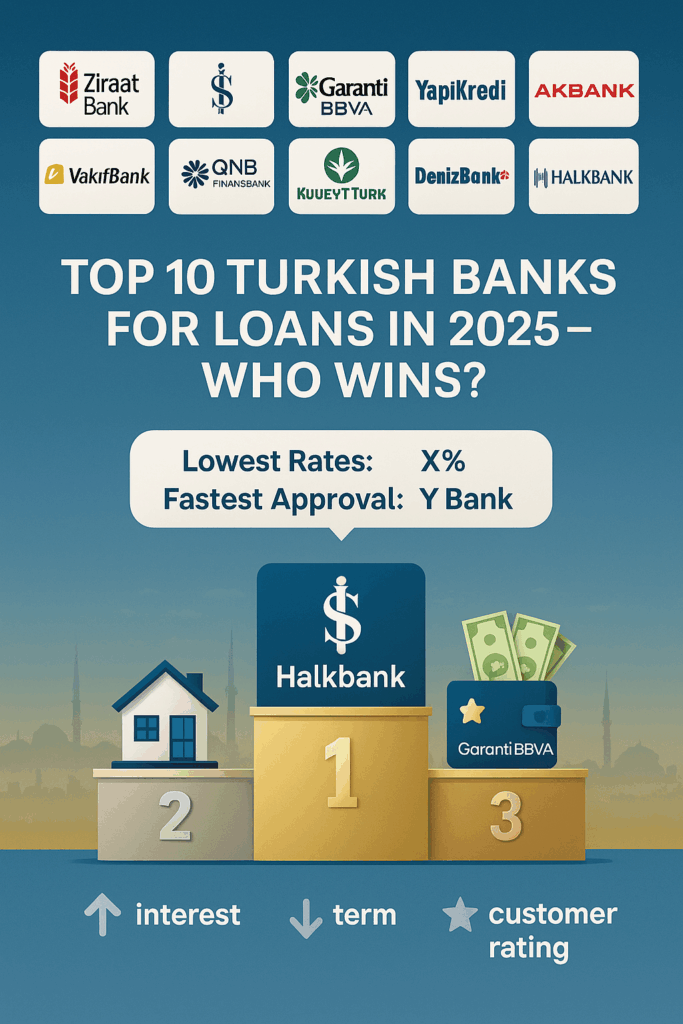Anúncios
The Turkish banking sector has undergone significant transformation in recent years, driven by high inflation rates, currency fluctuations, and rapid digital innovation.
With benchmark interest rates at 46% as of April 2025 and ongoing economic adjustments, choosing the right bank has become more crucial than ever for consumers and businesses alike.
This article provides a detailed comparison of Turkey’s top 10 banks, focusing on their interest rates, digital capabilities, product offerings, and customer service quality to help you identify which institution truly offers the best conditions for your specific needs in 2025.

1. Ziraat Bankası
As Turkey’s oldest and largest state-owned bank, Ziraat remains the market leader with approximately 4.95 trillion Turkish liras in total assets.
Founded in 1863, Ziraat’s extensive branch network (1,782 locations) and historical focus on agricultural financing have made it a dominant force in Turkish banking.
Key Strengths:
• Largest branch network nationwide, providing excellent accessibility in rural areas
• Government backing provides enhanced stability during economic volatility
• Competitive mortgage rates for primary residences
Anúncios
• Strong agricultural lending programs with subsidized rates
• Mobile banking app consistently ranks #1 in app store downloads
Areas for Improvement:
• Customer service can be bureaucratic compared to private competitors
• Foreign language support limited in many branches
• Digital innovation sometimes lags behind private sector rivals
Current Offerings:
• Mortgage loans: 39-41% interest (as of April 2025)
• Personal loans: 43-46% interest
• Term deposits: 44-48% annual return
• Agricultural financing with specialized terms
• Mobile banking with biometric authentication
2. İş Bankası (İşbank)
Founded in 1924 as Turkey’s first national bank, İşbank combines historical significance with technological innovation.
With over 1,200 branches and strong corporate governance, İşbank blends traditional banking strength with digital advancement.
Key Strengths:
• Pioneer in technological innovation and digital banking solutions
• Extensive ATM network with advanced functionality
• Strong corporate and investment banking capabilities
• Comprehensive international banking services
• İşCep mobile app consistently ranks in top 3 finance apps
Areas for Improvement:
• Higher fees for basic account services compared to some competitors
• Branch experience can vary significantly by location
• Response time for complex customer issues sometimes lengthy
Current Offerings:
• Mortgage loans: 40-42% interest
• Personal loans: 44-47% interest
• Term deposits: 43-47% annual return
• Comprehensive investment products including mutual funds
• Advanced digital banking platform with virtual assistant support
3. Garanti BBVA
With Spanish banking giant BBVA as its majority shareholder, Garanti BBVA brings international expertise to the Turkish market. Recognized for its customer-centric approach and digital innovation, Garanti BBVA has established itself as a leader in Turkey’s private banking sector.
Key Strengths:
• Award-winning mobile app with cutting-edge functionality
• Excellent English support services for expatriates
• Strong focus on sustainable banking and green financing
• Innovative credit card rewards programs
• Robust international banking capabilities
Areas for Improvement:
• Higher minimum balance requirements for premium services
• Branch coverage less extensive in some regions
• Account maintenance fees higher than some competitors
Current Offerings:
• Mortgage loans: 40-43% interest
• Personal loans: 45-48% interest
• Term deposits: 44-47% annual return
• Extensive credit card portfolio with tailored rewards
• Advanced mobile banking with personal financial management tools
4. Akbank
Founded in 1948, Akbank has built a reputation for financial strength and digital innovation. With approximately 800 branches and 4,550 ATMs nationwide, Akbank balances physical presence with digital capabilities.
Key Strengths:
• Strong record in digital innovation and mobile banking
• Pioneer in implementing fintech partnerships
• Excellent credit card offerings with competitive rewards
• User-friendly online banking interface
• Superior customer service in English at major branches
Areas for Improvement:
• Less extensive branch network than larger competitors
• Premium account packages require higher minimum balances
• Less focus on specialized agricultural or SME financing
Current Offerings:
• Mortgage loans: 39-42% interest
• Personal loans: 43-47% interest
• Term deposits: 45-48% annual return
• Comprehensive investment management services
• Advanced digital banking with AI-powered personal assistant
5. Yapı Kredi
Created through the merger of Koçbank and Yapı Kredi Bankası, this institution combines the strength of Turkey’s powerful Koç Group with banking expertise. Known for both retail and corporate banking excellence, Yapı Kredi has developed a strong presence in consumer financing.
Key Strengths:
• Excellent corporate banking services
• Strong credit card portfolio with versatile rewards
• Well-developed wealth management services
• Quality customer service across channels
• Good English support for expatriates and international customers
Areas for Improvement:
• Digital platforms sometimes lack features offered by competitors
• Branch network less extensive in eastern regions
• Higher fees for some international transactions
Current Offerings:
• Mortgage loans: 40-44% interest
• Personal loans: 44-48% interest
• Term deposits: 44-47% annual return
• Specialized private banking services
• Digital banking with integrated financial planning tools
6. VakıfBank
As one of Turkey’s major state-owned banks, VakıfBank combines government backing with modern banking practices. With assets reaching 3.5 trillion Turkish liras, VakıfBank plays a significant role in Turkey’s financial infrastructure.
Key Strengths:
• Strong government backing provides enhanced stability
• Competitive rates on mortgage products
• Extensive branch network with wide geographic coverage
• Good corporate and commercial banking services
• Special programs for public employees
Areas for Improvement:
• Digital banking platforms less advanced than private competitors
• Customer service quality varies significantly by branch
• Limited English support outside major urban centers
Current Offerings:
• Mortgage loans: 39-42% interest
• Personal loans: 43-47% interest
• Term deposits: 45-48% annual return
• Special financing packages for public sector employees
• Mobile banking with integrated bill payment services
7. Halkbank
Focused primarily on supporting small and medium-sized enterprises (SMEs), Halkbank is another major state-owned bank with a significant role in Turkey’s economic development.
Its name translates as “People’s Bank,” reflecting its mission to serve ordinary citizens and small businesses.
Key Strengths:
• Excellent SME financing programs with competitive rates
• Government-subsidized loan programs for specific sectors
• Extensive branch network in medium-sized cities
• Competitive deposit rates for retail customers
• Good basic banking services at reasonable fees
Areas for Improvement:
• Digital banking infrastructure less developed than market leaders
• Limited wealth management and investment products
• International banking services less comprehensive than larger banks
Current Offerings:
• Mortgage loans: 39-43% interest
• Personal loans: 44-48% interest
• Term deposits: 45-49% annual return
• Specialized SME financing packages
• Basic digital banking with essential functionality
8. TEB (Türk Ekonomi Bankası)
Partly owned by BNP Paribas, TEB combines international expertise with local market knowledge. TEB is particularly strong in providing specialized services for small businesses and professional segments.
Key Strengths:
• Strong customer segmentation approach with tailored offerings
• Excellent SME banking services
• Good wealth management capabilities
• International banking support through BNP Paribas connection
• Quality digital banking platforms
Areas for Improvement:
• Smaller branch network than major competitors
• Higher minimum balances for premium services
• Less competitive rates on basic deposit products
Current Offerings:
• Mortgage loans: 41-44% interest
• Personal loans: 45-48% interest
• Term deposits: 43-46% annual return
• Specialized professional banking packages
• Digital banking with business management tools for SMEs
9. Denizbank
Formerly owned by Russia’s Sberbank and now under Emirates NBD ownership, Denizbank has carved out a niche in retail banking and agricultural financing. Known for its customer-friendly approach, Denizbank balances innovation with accessibility.
Key Strengths:
• Strong focus on agricultural and rural financing
• Innovative retail banking products
• User-friendly digital banking platforms
• Good credit card offerings with competitive rewards
• Flexible personal loan terms
Areas for Improvement:
• Limited branch network compared to larger banks
• Less developed corporate banking services
• Foreign currency services less comprehensive than international banks
Current Offerings:
• Mortgage loans: 41-45% interest
• Personal loans: 45-49% interest
• Term deposits: 44-47% annual return
• Specialized agricultural financing packages
• Digital banking with integrated expense tracking
10. Kuveyt Türk
As one of Turkey’s leading participation (Islamic) banks, Kuveyt Türk operates according to interest-free banking principles. Owned primarily by Kuwait Finance House, it provides Sharia-compliant alternatives to conventional banking products.
Key Strengths:
• Full range of interest-free banking products
• Strong ethical banking principles
• Growing branch network across Turkey
• Good digital banking platform for Islamic banking
• Unique profit-sharing investment accounts
Areas for Improvement:
• Smaller branch network than conventional banks
• Limited product range compared to conventional alternatives
• Less competitive pricing on some financing products
Current Offerings:
• Home financing: profit rates equivalent to 38-42% conventional interest
• Personal financing: profit rates equivalent to 42-47% conventional interest
• Participation accounts: 42-46% profit-sharing rates
• Interest-free investment options
• Mobile banking with Sharia-compliant features
Digital Banking Landscape in 2025
The digital banking revolution has transformed Turkey’s financial services sector, with mobile applications now handling over 85% of all banking transactions. Several important trends have emerged:
Mobile App Rankings and Features
As of late 2024, app store rankings show Ziraat Mobil, Garanti BBVA Mobile, and İşCep (İşbank) consistently among the top three finance apps in Turkey. These applications offer increasingly sophisticated features beyond basic banking:
• Ziraat Mobil:
Leads in user numbers with straightforward interface, strong security features, and specialized agricultural financing tools
• Garanti BBVA Mobile:
Recognized for innovation with personalized insights, spending analysis, and integration with other financial services
• İşCep:
Strong in investment tools, corporate banking features, and integration with payment systems
All major Turkish banking apps now offer biometric authentication, instant notifications, card management, investment platforms, and personalized financial insights.
Banking Without Branches
Turkey has embraced the concept of branchless banking, with several institutions offering:
• Video banking for consultations and application processes
• Cardless ATM withdrawals using QR codes
• Banking kiosks in shopping centers and transport hubs
• Digital onboarding processes requiring minimal physical documentation
This shift has been accelerated by Turkey’s young, tech-savvy population and widespread smartphone adoption.
Current Interest Rate Environment
The high inflation environment in Turkey continues to impact banking conditions significantly. As of April 2025, Turkey’s benchmark interest rate stands at 46%, significantly influencing all banking products:
Deposit Rates
Term deposit rates currently range from 43-49% annually, providing nominal protection against Turkey’s high inflation rate (which reached 67% in February 2024 and has moderately decreased since). When evaluating real returns, customers should consider:
• State banks typically offer 1-2% lower rates than private banks
• Longer-term deposits (6+ months) generally receive 1-3% higher rates
• Special campaigns periodically offer premium rates for new deposits
• Foreign currency deposits offer significantly lower rates but protection against lira depreciation
Loan Rates
Current lending rates reflect both high benchmark rates and credit risk premiums:
• Mortgage loans: 39-45% (average 40.87% as of December 2024)
• Personal loans: 43-49%
• Vehicle loans: 42-47%
• Business loans: 40-52% (depending on business size and sector)
State-owned banks typically offer 1-3% lower rates on mortgages compared to private banks, especially for first-time homebuyers, while private banks often provide more flexibility in terms and conditions.
Account Fees and Charges
Banking fees vary significantly across institutions and account types:
• EFT/Transfer Fees: Range from 5-30 TL depending on amount and bank
• Card Annual Fees: 100-1,500 TL for credit cards depending on type
• Account Maintenance: 0-50 TL monthly (often waived with minimum balances)
• ATM Fees: 0-15 TL for non-bank ATM withdrawals
• Foreign Transaction Fees: 3-5% with additional exchange rate margins
Digital-first services generally offer lower fee structures, while premium account packages with dedicated service representatives command higher fees but include additional benefits.
Frequently Asked Questions
Which Turkish bank offers the best interest rates on deposits?
As of April 2025, private banks like Akbank and Denizbank generally offer the highest deposit rates at approximately 47-49% for 32+ day terms.
However, rates change frequently, and special promotional campaigns can temporarily boost rates at any institution. State-owned banks typically offer slightly lower rates but with added perceived stability.
Are Turkish banks safe given the economic volatility?
The Turkish banking sector is well-regulated and maintains strong capital adequacy ratios despite economic challenges.
Deposits are protected by the Savings Deposit Insurance Fund (TMSF) up to 200,000 TL per person per bank, providing basic security for retail depositors. State-owned banks carry implicit government backing, while international banks benefit from parent company support.
Which bank has the best mobile app for everyday banking?
Garanti BBVA Mobile consistently ranks as the most user-friendly and feature-rich banking app according to multiple independent assessments, with İşCep (İşbank) and Akbank Mobile following closely.
For English-language support, Garanti BBVA and Yapı Kredi offer the most comprehensive non-Turkish options.
What documents are needed to open a bank account in Turkey?
Turkish citizens typically need only their Turkish ID card (kimlik), while foreign residents require their residence permit (ikamet), passport, and tax identification number (vergi kimlik numarası).
Some banks may request additional proof of address or income depending on the account type. Account opening can be completed in a single branch visit in most cases, with some banks now offering digital onboarding.
Do Turkish banks offer accounts in foreign currencies?
Yes, most major Turkish banks offer accounts in USD, EUR, and GBP, with some also providing accounts in other major currencies.
These accounts typically offer much lower interest rates than TL accounts (0.5-2% annually) but provide protection against currency depreciation. Note that there may be restrictions on foreign currency transactions depending on current regulations.
Conclusion
Turkey’s banking sector presents a complex landscape where high interest rates, rapid digital innovation, and economic variables all impact the customer experience.
For everyday banking needs with strong digital capabilities, Garanti BBVA and Akbank lead the market in customer satisfaction and technological innovation. Those prioritizing interest rates should consider Akbank and İşbank, which typically offer the most competitive deposit terms.
Meanwhile, customers seeking widespread branch access and government stability would be well-served by state banks like Ziraat and VakıfBank. The optimal choice ultimately depends on your specific financial needs, geographical location, and preference for digital versus in-person banking services.


